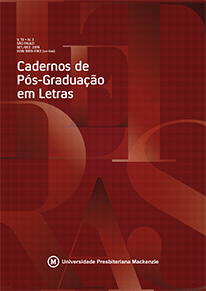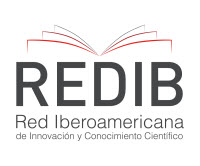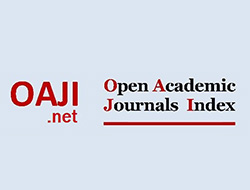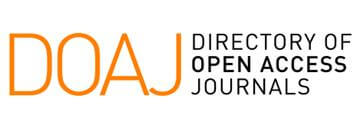Tarefas de tradução e ensino de L2 pela hipótese da produção
uma possível interface
Palavras-chave:
Ensino, Língua estrangeira, TraduçãoResumo
Este estudo visa investigar a existência de uma possível interface entre atividades de tradução na sala de L2 e as funções da hipótese da produção de Swain. Para fundamentarmos teoricamente esta investigação, recorremos aos estudos de Swain (1985, 1993, 1995, 1998, 2000a, 2000b) e a outros estudos referentes à hipótese da produção. A metodologia previu a condução de um experimento prático com uma atividade de tradução para a geração de dados. Participaram da pesquisa oito estudantes de graduação em Letras-Inglês, os quais fizeram uma atividade em dupla, gravada em áudio. Os resultados comprovam que as funções ocorrem de forma entrelaçadas e justapostas dentro dos processos cognitivos exigidos pela referida tarefa.
Downloads
Referências
BALBONI, P. E. A tradução no ensino de línguas: história de uma difamação. Tradução Maria Teresa Arrigoni. In-Traduções, v. 3, n. 4, 2011. Disponível em: https://periodicos.ufsc.br/index.php/intraducoes/article/view/62244. Acesso em: 15 out. 2019.
BRANCO, S. O. Teorias da tradução e o ensino de língua estrangeira. Horizontes de Linguística Aplicada, v. 8, n. 2, p. 185-199, 2009.
BRANCO, S. O. As faces e as funções da tradução em sala de aula estrangeira. Cadernos de Tradução, v. 1, n. 27, p. 161-177, 2011.
D’ELY, R. C. S. F. A focus on learners’ metacognitive processes: the impact of strategic planning, repletion, strategic planning plus repetition, and strategic planning for repetition on L2 oral performance. 2006. Tese (Doutorado em Letras) – Universidade Federal de Santa Catarina, Florianópolis, 2006.
FERRONI, R. O papel da língua materna na sala de língua. In-Traduções, v. 3, n. 5, 2011.
GASS, S. Input interaction, and the second language learner. Mahwah, NJ: Lawrence Erlbaum Associates, 1997.
GASS, S. M. Input and interaction. In: DOUGHTY, C. J.; LONG, M. L. (ed.). The handbook of second language acquisition. Oxford: Blackwell, 2005. p. 224-225.
GIESTA, L. C. A tradução como estratégia no ensino de língua inglesa em cursos de licenciatura. Cultura &Tradução, João Pessoa, v. 1, n. 1, p. 1-9, 2011.
GUARÁ-TAVARES, M. G. The relationship among pre-task planning, working memory capacity and L2 speech performance: a pilot study. Linguagem & Ensino, v. 12, p. 165-194, 2009.
HANAOKA, O. Output, noticing and learning: an investigation into the role of spontaneous attention to form in a four-stage writing task. Language Teaching Research, v. 11, n. 4, p. 459-479, 2007.
IZUMI, S. Output, input enhancement, and the noticing hypothesis: an experimental study on ESL relativization. Studies in Second Language Acquisition, v. 24, p. 541-577, 2002.
IZUMI, S. Comprehension and production processes in second language learning: in search of the pyscholinguistic rationale of the output hypothesis. Applied Linguistics, v. 24, n. 2, p. 168-196, 2003.
IZUMI, S. et al. Testing the output hypothesis: effects of output on noticing and second language acquisition. Studies in Second Language Acquisition, v. 21, p. 421-452, 1999.
LANTOLF, J. P.; THORNE, S. L. Sociocultural theory and second language learning. In: VANPATTEN, B.; WILLIAMS, J. Theories in second language acquisition: an introduction. Mahwah: Routledge, Taylor & Francis Group, 2008.
LONG, M. H. Native speaker/non native speaker conversation and the negotiation of comprehensible input. Applied Linguistics, v. 4, n. 2, p. 126-141, 1983.
LUCINDO, E. S. Tradução e ensino de línguas estrangeiras. Scientia Traductiones, Florianópolis, v. 1, n. 3, p. 1-10, 2006.
PICA, T. Second language acquisition, social interaction, and the classroom. Applied Linguistics, v. 8, n. 1, p. 3-21, 1987.
QI, D. S.; LAPKIN, S. Exploring the role of noticing in a three-stage second language writing task. Journal of Second Language Writing, v. 10, p. 277-303, 2001.
SANTORO, E. Tradução e ensino de línguas estrangeiras: confluências. Cadernos de Tradução, v. 1, n. 27, 2011.
SHEHADEH, A. Comprehensible output, from occurrence to acquisition: an agenda for acquisitional research. Language Learning, v. 52, n. 3, p. 597-647, 2002.
SHEHADEH, A. Learner output, hypothesis testing, and internalizing linguistic knowledge. System, v. 31, p. 155-171, 2003.
SWAIN, M. Communicative competence: some roles of comprehensible input and comprehensible output in its development. In: GASS, S. M.; MADDEN, C. (ed.). Input in Second Language Acquisition. Roley, MA: Newsbury House, 1985. p. 235-253.
SWAIN, M. The output hypothesis: just speaking and writing aren’t enough. Canadian Modern Language Review, v. 50, n. 1, p. 158-164, 1993.
SWAIN, M. Three functions of output in second language learning. In: COOK, G.; SEIDLHOFER (org.). Principles and practice in applied linguistics. Oxford University Press, 1995. p. 125-144.
SWAIN, M. Focus on form classroom second language acquisition through conscious reflection. In: DOUGHTY, C.; WILLIAMS, J. (org.). Focus on form. Cambridge: Cambridge University Press, 1998. p. 64-81.
SWAIN, M. The output hypothesis and beyond: mediating acquisition through collaborative dialogue. In: LANTOLF, J. P. (ed.). Sociocultural theory and second language learning. Oxford: Oxford University Press, 2000a. p. 97-114.
SWAIN, M. Task-based second language learning: the uses of the first language. Language Teaching Research, v. 4, n. 3, p. 253-276, 2000b.
SWAIN, M. Learner output, hypothesis testing, and internalizing linguistic knowledge. System, v. 31, p. 155-171, 2003.
SWAIN, M.; LAPKIN, S. Problems in output and the cognitive processes they generate: a step towards second language learning. Applied Linguistics, v. 16, p. 371-391, 1995.
WEISSHEIMER, J. Working memory capacity and the development of L2 speech production. 2007. Tese (Doutorado em Letras) – Universidade Federal de Santa Catarina, Florianópolis, 2007.
Downloads
Publicado
Como Citar
Edição
Seção
Licença
Os direitos autorais dos artigos publicados nos Cadernos de Pós-Graduação em Letras pertencem aos autores, que concedem à Universidade Presbiteriana Mackenzie os direitos exclusivos de publicação do conteúdo. É vedada sua reprodução total ou parcial sem a devida autorização da Comissão Editorial, exceto para estudo e pesquisa.











